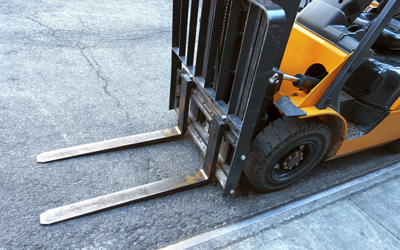 The left fork on the vessel’s forklift truck was stuck. Two ABs and an engineer inspected the forklift to try and find the problem. They were all wearing the correct PPE: hard hats, boiler suits, high visibility vests and boots with steel caps.
The left fork on the vessel’s forklift truck was stuck. Two ABs and an engineer inspected the forklift to try and find the problem. They were all wearing the correct PPE: hard hats, boiler suits, high visibility vests and boots with steel caps.
After consulting a blueprint and the locking pin arrangement for the fork, it was decided that the first attempt would be to free the pin by trying to lift the fork, allowing a screwdriver to be placed in the pinhole and lifting it clear of the locked position. The plan was to slide the fork clear of the carriage on the outer side and then repair the pin once the fork had been removed. This plan required a safety stop to be removed to allow the fork to be slid off. This safety stop was subsequently removed.
Read more what happens next in the latest monthly safety scenario case.
Download the MSS case for August here»
For more Loss Prevention information, please contact:
Joakim Enström, Loss Prevention Officer
E-mail: joakim.enstrom@swedishclub.com
Each month the Club’s Loss Prevention team issues a new safety scenario to assist members in their efforts to comply with international safety regulations and to follow best practice.
When discussing the case please consider that the actions taken at the time made sense for all involved. Do not only judge, but also ask why you think these actions were taken and could this happen on your vessel?